Churchill supposedly said democracy is the worst system, except for all others. I’ve said the problem of democracy is voters.
Democracy has always been a pillar of my belief system, not from gauzy idealism, but pragmatism, from my deep study of history. It’s better when people have a say in their governance, rather than being exploited by self-interested rulers, who aren’t accountable. It’s also better in its material results, for human well-being, proven to promote peace, prosperity and happiness. Fulfilling, as Francis Fukuyama wrote, a deep psychological hunger for recognition of one’s human dignity.
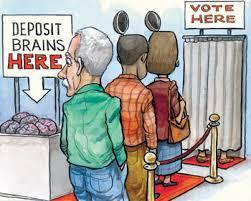
That’s been my theory. But it’s been repeatedly shaken by voter behavior. In country after country we see reasonable moderate centrist options shunned, producing run-offs between extremists. And the bizarre appeal of just plain rotters (like Brazil’s Bolsonaro, such an obvious creep, still very popular). With the ever-misguided lure of the “strong leader.”
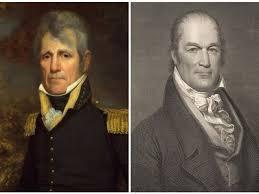
Unconscious psychological factors loom large. In the TV age, the taller nominee tends to win U.S. presidential elections. In a study, young children shown only candidate photos guessed election winners with striking prescience.
American voters in 2024 chose worse than I could ever have imagined. Forcing me to ponder seriously whether some different system might be preferable.
One perhaps resembling what our founders originally envisioned — a more moderated democracy. Exemplified by the electoral college, designed as a group of enlightened leading citizens who would sagaciously pick the best person as president.
That original concept was undone when political parties arose. The founders looked askance on that, but it has actually served, for most of our history, as a good way for organizing politics to facilitate citizen participation, providing coherent vehicles for them to realize their political goals. And the whole system, even including the electoral college, worked quite well. Until lately.
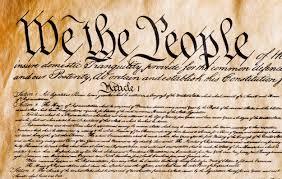
The world has changed in many ways, and our 1787 constitution now seems maladaptive. Should we just scrap it, and hold another constitutional convention? Probably a terrible idea given the pathologies currently loose in America’s civic landscape. (Look at Chile’s recent troubles in trying to make a new constitution from scratch.) A key problem quite simply being many citizens’ divorcement from reality. Okay, they didn’t like what they felt was happening to their country. Even accept they weren’t repelled by Trump’s transgressiveness but embraced it. And yet still their choice made no sense from the standpoint of effectual action in the actual real world. They won’t get what they imagined they were voting for.
So America today looks less ready for democracy than ever. Even back when education and access to information were much more limited, voters at least mostly had some common sense. Decency, character, integrity, honesty, etc., mattered. Or so it seemed. Maybe it’s just that a contrary voting option never arose before.

The British — who actually have no formal constitution — have operated under the “good chap” theory of politics. That everyone will follow basic rules of propriety and self-restraint. Boris Johnson tested that theory. Trump has tested the American equivalent. Through most of my life observing politics, their kind of behavior was simply inconceivable. And while the Brits finally upchucked Johnson, here Trump reigns triumphant. I always thought Americans basically good; now half are revealed as base and sick, at least in their political behavior.
I’ve mentioned parties as vehicles for organizing political debate. They’ve never been ideological monoliths, yet divergent philosophies did play a role, helping politics make sense, facilitating public debate and resolution of issues. But today what largely drives political differences is social class. Mainly educated versus less educated. This even seems to trump race in many ways. And whereas ideological politics enables us to debate issues and compromise, there can be no real debate or compromise when it comes to social class. That’s a zero-sum thing.
I frankly don’t have good answers for any of this. Certainly not for the Tiktokification that’s hollowed out our brains. The founders’ idea of a buffer like the electoral college between voters and government won’t fly now. And with any constitutional change requiring approval by 38 states, we are pretty much stuck with what we’ve got. Yet some reforms could at least help.
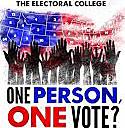
Start with the electoral college. Protected by that 38-state requirement, smaller states (and Republicans) will never agree to cede their disproportionate power. However, there is a work-around — the National Popular Vote Interstate Compact. An agreement among states that each will assign its electoral votes to the national popular vote winner. Once states representing 270 electoral votes enact that, it goes into effect. So far states with 209 have done so. To get the others needed would presumably require Democratic control there, but that’s a far lower hurdle than needing 38 states.*
This would transform presidential politics — the national popular vote would rule. No more “swing state” distortions — candidates would now seek votes in all population centers.

Second, our two-party voting system has come to promote partisan extremism and polarization. Especially with widely gerrymandered districts, elections are often settled in primaries rather than November. But far fewer people vote in primaries, overly empowering the most ideologically activist, to whom candidates consequently kow-tow.
Here, open primaries would help; that is, allowing anyone to vote in any primary, rather than restricting it to registered party members. This goes against my feeling that parties should mean something. However, that concept is broken, and we’d now be better off with open primaries as inoculation against extremism.
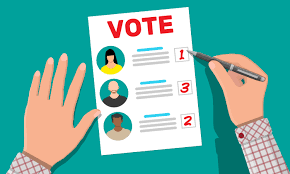
Another good thing would be ranked-choice voting. (That is, “instant run-off” voting.) Preventing candidates with narrow support from winning, favoring more broadly-based ones. This has been tried in several places and works well. Yet, on the ballot in a bunch of states in 2024, it was rejected nearly everywhere. (The two parties’ politicos hate the idea.)
A further reform would be to end the Senate filibuster rule, which in effect requires 60 votes to pass anything substantive. The Senate is already gerrymandered, with many small states having disproportionate power; the filibuster aggravates that, giving a veto to senators representing a distinct minority of our population. The Senate itself can change this; and it would not require 60 votes. Here again, this reform would make for a very different dynamic, a major antidote to governmental gridlock and dysfunction, which in turn would have a positive effect on our whole political picture.
Republicans, now in control of the Senate, may actually finally abolish the filibuster, to boost their power even more. Actually, Trump’s power. But at least that would make them more accountable to the voters who entrusted them with that power.

But all of what I’ve suggested may be the proverbial rearranging of deck chairs on the Titanic, as America sinks into ideocracy.
Finally, I long said democracy could not endure with people losing touch with its ideals and values. South Koreans recently proved they haven’t, when their president attempted martial law. But they had unhappy experience with “strongman” rule.

Many Americans in contrast are deluded on that score, “strength” a key factor electing Trump. It’s said that South Korean events should be a lesson for him. But he probably thinks himself smarter than their president, whose martial law puts an idea in his head.
* Another possibility would be allotting each state’s electoral votes by congressional district, rather than winner-take-all. Two states already do that. But it would also be resisted by Republicans, as curbing their built-in electoral college advantage.
